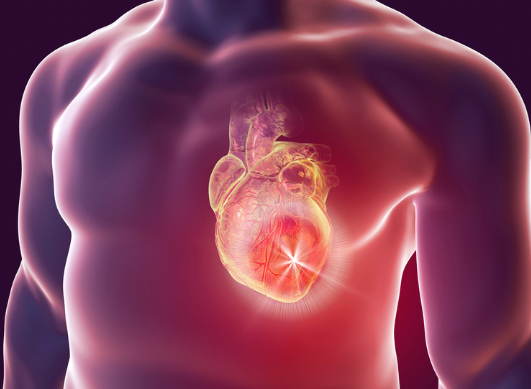Diabetes: What cardiovascular diseases can it lead to?
Published Jun 29, 2024 • By Somya Pokharna
While managing diabetes is important for overall health, one of the most significant concerns is its impact on cardiovascular health. Diabetes significantly increases the risk of developing cardiovascular diseases (CVD), including coronary artery disease, heart attack, stroke, and peripheral artery disease.
So, what is the link between diabetes and heart disease? What are the risk factors for cardiovascular complications? How can they be prevented and managed?
Take a beat, and dive into this article to find out.

What is the link between diabetes and cardiovascular diseases (CVD)?
People with diabetes are at a considerably higher risk of developing cardiovascular problems such as coronary artery disease, heart attack, stroke (CVA), and peripheral artery disease. High blood sugar levels can damage blood vessels and nerves that control the heart. Additionally, people with diabetes often have other conditions that contribute to heart disease, such as high blood pressure (hypertension) and high cholesterol. Several mechanisms explain this increased risk:
Atherosclerosis
High blood sugar levels lead to the formation of plaques in the arteries, causing them to harden and narrow (atherosclerosis). This reduces blood flow and increases the risk of heart attack and stroke.
Endothelial Dysfunction
The endothelium, a thin membrane lining the heart and blood vessels, can become dysfunctional due to high glucose levels. This dysfunction contributes to atherosclerosis and impairs blood vessel dilation, increasing blood pressure and the risk of CVD.
Inflammation
Chronic inflammation, common in diabetes, accelerates the development of atherosclerosis and other cardiovascular conditions.
What cardiovascular diseases can occur due to diabetes?
Some common cardiovascular complications that may arise in an individual living with diabetes are:
Coronary Artery Disease (CAD)
CAD occurs when the coronary arteries, which supply blood to the heart, become damaged or diseased. This can lead to angina (chest pain), heart attacks, and heart failure. Symptoms may include chest pain, shortness of breath, and fatigue.
Stroke
A stroke occurs when the blood supply to part of the brain is interrupted or reduced, depriving brain tissue of oxygen and nutrients. Diabetes increases the risk of stroke by contributing to atherosclerosis and high blood pressure.
Peripheral Artery Disease (PAD)
PAD is a condition where narrowed arteries reduce blood flow to the limbs, usually the legs. Symptoms include leg pain when walking (claudication), numbness, and coldness in the lower legs and feet.
Heart Failure
Heart failure occurs when the heart cannot pump enough blood to meet the body's needs. Diabetes can lead to heart failure through its impact on blood vessels and the heart muscle.
Who is at risk for developing cardiovascular conditions due to diabetes?
Everyone with diabetes is at an increased risk of cardiovascular complications, but certain factors can elevate this risk further:
- Duration: The longer a person has diabetes, the higher their risk of developing CVD.
- Poor blood sugar control: Consistently high blood sugar levels accelerate vascular damage.
- High blood pressure and cholesterol: These conditions, often coexisting with diabetes, significantly increase the risk of heart disease.
- Obesity: Excess weight, particularly around the abdomen, is linked to higher cardiovascular risk.
- Smoking: Smoking exacerbates the harmful effects of diabetes on the heart and blood vessels.
How to prevent and manage cardiovascular disease in diabetes?
Managing diabetes effectively is crucial to preventing cardiovascular complications. Here are some strategies:
Blood sugar control
Regular monitoring helps keep blood sugar levels within target ranges. Insulin or oral medications can also help.
A balanced diet rich in fruits, vegetables, whole grains, and lean proteins helps control blood sugar.
Blood pressure and cholesterol management
Keeping track of blood pressure and cholesterol levels is crucial, and blood pressure medications (antihypertensives) and cholesterol-lowering drugs (statins) may be necessary.
They can also be managed naturally by reducing sodium intake, eating heart-healthy foods, and engaging in regular physical activity.
Lifestyle changes
Quitting smoking is critical to reduce cardiovascular risk.
Losing excess weight can also improve heart health and blood sugar control. Aim for at least 150 minutes of moderate aerobic activity or 75 minutes of vigorous activity each week.
Techniques such as yoga, meditation, and deep breathing exercises can help manage stress, which affects blood sugar levels and cardiovascular health.
Regular check-ups
Routine medical check-ups and screenings can detect and address risk factors early.
Diabetes can cause complications in the eyes and feet, which need regular monitoring and examining.
Key Takeaways
The relationship between diabetes and cardiovascular complications is complex and significant. By understanding the risks and implementing effective management strategies, individuals with diabetes can reduce their risk of cardiovascular diseases and lead healthier lives. Regular medical care, a healthy lifestyle, and adherence to treatment plans are vital components in managing diabetes and its cardiovascular impacts.
Was this article helpful to you?
Give it a "Like" and share your thoughts and questions with the community in the comments below!
Take care!
Comments
You will also like

Diabetes: Discrimination, Professional Life, Plan Ahead... What do patients say?
Nov 9, 2018 • 9 comments

 Facebook
Facebook Twitter
Twitter

